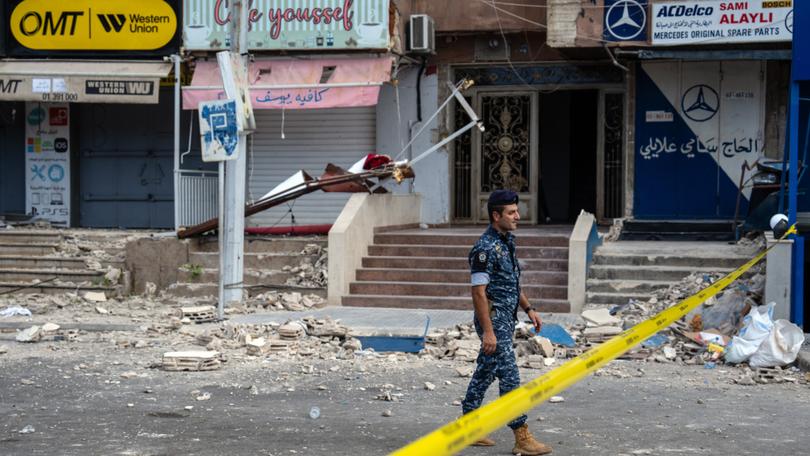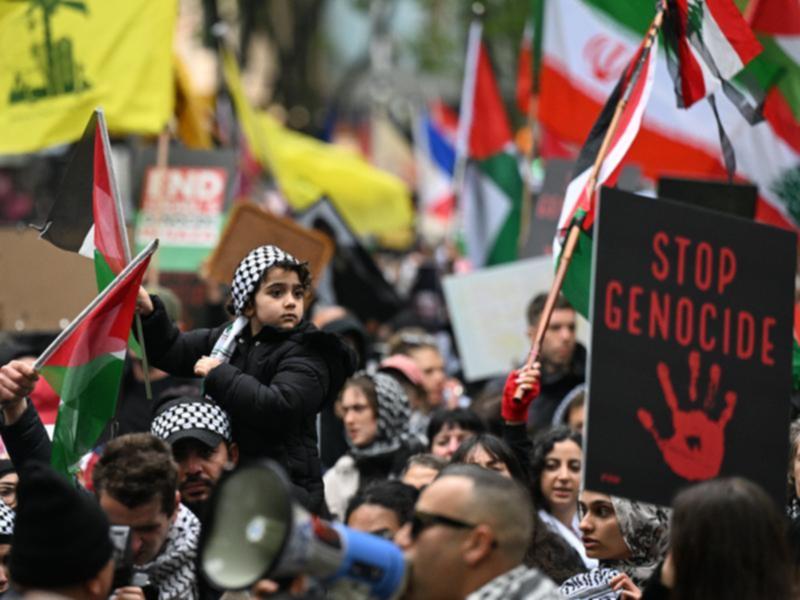‘Come home to safety’: Anthony Albanese’s plea to Aussies still in Lebanon
Prime Minister Anthony Albanese has pleaded for Australians to take what could be the last opportunities to ‘come home to safety’ after Israel began its ground operation in Lebanon.

Prime Minister Anthony Albanese has pleaded for Australians to take what could be the last opportunities to ‘come home to safety’ after Israel began its “targeted ground raids” against Hezbollah in Lebanon.
Australians in Lebanon are at risk of becoming trapped in a warzone and must take the last available escape routes, the Government has pleaded, after Israel began “targeted ground raids” against Hezbollah targets in the country’s south.
After months of repeated warnings for people to leave the region as the security situation deteriorated, the Department of Foreign Affairs and Trade is attempting to secure any available airline tickets to help some of the estimated 15,000 Australians in Lebanon before the Beirut airport closes.
Sign up to The Nightly's newsletters.
Get the first look at the digital newspaper, curated daily stories and breaking headlines delivered to your inbox.
By continuing you agree to our Terms and Privacy Policy.Mr Albanese on Tuesday said despite warnings not being heeded to date, there was still time.
“We’re looking at all the measures that are available at our disposal... There is still commercial opportunities available... We want Australians to take up the opportunity to come home to safety,” he said.
The Australian Defence Force has air and ground resources in the region ready to evacuate Australians should the need arise.
Opposition Leader Peter Dutton said while it was important Australians who needed evacuation could be helped, he wanted assurances from the Government that security would not be compromised.
“We need to make sure that people who we’re bringing out at the 11th hour in difficult circumstances where bombs are dropping, that we’re not compromising on security checks of people that we’re bringing back to Australia as well,” he said.
Labor ministers did not respond to Mr Dutton’s concerns about national security, but used their media appearances on Tuesday to strengthen the Government’s pleas for an urgent ceasefire and de-escalation.
Home Affairs Minister Tony Burke said Australia did “not want Lebanon to become the next Gaza”.
“We are seeing the beginnings of extraordinary civilian casualties,” he said.
The escalation in Lebanon came as the political fallout from rallies in Sydney and Melbourne on Sunday continue, with Mr Dutton demanding pro-Hezbollah protesters be charged immediately, or deported if they are on visas.
At least six people were referred by Victoria Police to the Australian Federal Police, and could face prosecution over the rallies, where some protesters waved Hezbollah flags and held photos glorifying slain terrorist leader Hassan Nasrallah.
It’s been further reported some mosques in Sydney have also held vigils mourning Nasrallah, who was killed by an Israeli strike in Beirut on the weekend.
The Australian Federal Police confirmed that under hate-symbol laws passed late last year, the “mere display” of the flags did not constitute an offence, and other elements relating to context have to be proven.
Deputy Commissioner Krissy Barrett said the law — as yet untested in court — laid out several conditions that would need to be met to convict.
“It’s got to be done in circumstances in which a reasonable person would consider that the conduct either advocates inciting others to use violence or use force (or) could incite others to humiliate or intimidate based on religion,” she said.
“The context around the conduct is extremely important … If they’re holding the flag, what are they saying? What are they chanting? What are they wearing? What sort of physical behaviour are they demonstrating?”
That prompted Mr Dutton to lead calls for Parliament to urgently pass stronger laws – even if it meant being recalled before returning next week – and accuse the Government, and by proxy the AFP, of being “weak” on hate.
Mr Albanese said there was “no place for mourning a terrorist leader” in Australia, and added he was “very concerned” about the use of terrorist symbols but defended the process of investigation being carried out by police.
“The AFP and authorities will be investigating. Any use of terror symbols will be investigated,” he said.

Mr Dutton said the Government should make it “very clear” to the AFP commissioner and Director-General of ASIO that “we don’t have any tolerance of this sort of glorification of a terrorist leader”.
Denying he was seeking to undermine their work, Mr Dutton said the AFP did an “outstanding job” but took their lead ultimately from the Prime Minister, and questioned why the Government hadn’t planned for such protests.
“If the laws are inadequate, then the Australian Federal Police Commissioner should advise the Minister and the Parliament should deal with it as a matter of urgency,” Mr Dutton said.
“We would support the Government in any changes that are required to stop the glorification of a terrorist organisation.”
Mr Dutton has also called for the Government to urgently deport any pro-Hezbollah protesters or vigil attendees who were on a visa.
“The Minister should not hesitate in cancelling the visas of those people and deporting them back to the country from where they originate,” Mr Dutton said.
Mr Burke said there was no indication the protesters were visa-holders, but maintained that if that were found to be the case the Government would not hesitate to take strong action.
He further slammed Mr Dutton for politicising the protests, accusing him of undermining fragile social cohesion and “throwing kerosene on the fire”.
“With Peter Dutton, it remains the case that no matter how many times our security agencies say we need to lower the temperature in Australia, he wants to raise the temperature every single time,” he told ABC Radio.
“He doesn’t want to recall parliament because he wants to change laws that he supported a year ago, he wants to recall parliament because he wants to throw more kerosene on the fire and get people angrier with each other and say more outrageous things in the parliament. That’s what it’s about. It’s nothing to do with Australia.”

